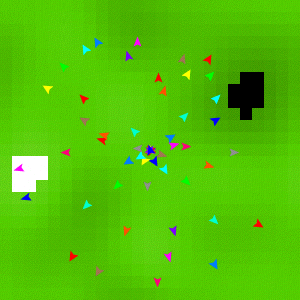

Official journal of the Society for Personality and Social Psychology, Inc. Smith, E.R., Conrey, F.R.: Agent-based modeling: a new approach for theory building in social psychology. Rouchier, J., et al.: Progress in model-to-model analysis. Revelle, W.: psych: procedures for psychological, psychometric, and personality research. Nadal, J.-P.: Meet, discuss, and segregate!. Kiesling, E., et al.: Agent-based simulation of innovation diffusion: a review.

Jager, W.: Uniformity, bipolarization and pluriformity captured as generic stylized behavior with an agent-based simulation model of attitude change. Hegselmann, R., Krause, U.: Opinion dynamics and bounded confidence: models, analysis and simulation. Gilbert, N., Troitzsch, K.G.: Simulation for The Social Scientist, 2nd edn. ISSN 1460-7425įrench, J.R.P.: A formal theory of social power. ISBN 7-3įlache, A., et al.: Models of social influence: towards the next frontiers. Princeton University Press, Princeton (2007). Įpstein, J.: Generative social science: studies in agent-based computational models, January 2006Įpstein, J.M.: Generative Social Science: Studies in Agent-Based Computational Modeling. Ĭonte, R., et al.: Manifesto of computational social science. In: Proceedings of the International Conference on Competitive Manufacturing (2019)Ĭonte, R., Paolucci, M.: On agent based modelling and computational social science. Valdez, A.C., Ziefle, M.: Predicting acceptance of novel technology from social network data-an agent-based simulation-approach. understanding the human-in-the-loop using agent-based modeling. Ĭalero Valdez, A., Ziefle, M.: Human factors in the age of algorithms. Valdez, A.C.: rmdtemplates: rmdtemplates - an opinionated collection of rmarkdown templates. īyrne, D.: Complexity Theory and the Social Sciences. īruch, E., Atwell, J.: Agent-based models in empirical social research. īonabeau, E.: Agent-based modeling: methods and techniques for simulating human systems. Keywordsīarnier, J.: rmdformats: HTML output formats and templates for ‘rmarkdown’ documents. Thus the choice of the programming language remains always a trade-off and in future more complex models should be considered using both programming languages. While Julia is much faster in simulating a model, Netlogo has a nice Interface and is more intuitive to use for non-computer scientists. We analyzed, which of the languages is better for the creation of agent-based models and found, that both languages have some advantages for the creation of simulations. Using two programming languages (Netlogo and Julia) we simulate a simple bounded-rationality opinion formation model with and without backfire effect. As a method well suited for the consideration of complex phenomena, we consider agent-based models in this study. Analysing complex phenomena, such as the world we live in, or complex interactions, also requires methods that are suitable for considering both the individual aspects of these phenomena and the resulting overall system.


 0 kommentar(er)
0 kommentar(er)
